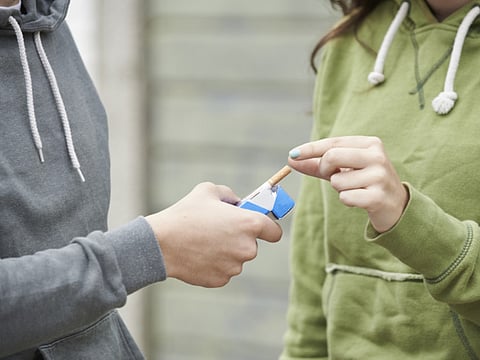Nine months after sin tax, young adults think differently about tobacco
Three out four people interviewed say they have reduced their daily intake of nicotine since October 2017

Dubai: Nine months after the UAE imposed a 100 per cent excise tax on cigarettes, some young adults say the new measures have made them think differently about tobacco.
In conversations with Gulf News, three out of four people said they have reduced their daily intake of nicotine.
Reduction in tobacco consumption is a common trend in countries that have adopted excise tax.
According to World Health Organisation (WHO), tobacco taxes are the most cost-effective way to reduce tobacco use, especially among young and poor people.
The Surgeon General of the United States of America has also called raising prices of cigarettes as “one of the most effective tobacco control interventions” because increasing price has proven to reduce smoking, especially among kids.
Mariam Hadi, a 21-year-old Palestinian expat, said the excise tax was a big incentive for her to cut down on smoking cigarettes.
“It definitely did impact my smoking habits. I reduced my smoking because I also realised it was not good for my health, so it was a chance to start a healthier lifestyle. I began smoking when I was only 17,” said Hadi, who works in corporate finance.
Hadi said she is down to one pack a week and plans to completely quit in the future.
“I noticed that after I reduced my smoking, my sense of smell and taste improved a bit and I can also exercise better.”
Similarly, Firas Amer, a 22-year-old university student from Jordan, said the doubling of tobacco prices did impact his consumption of cigarettes because he could no longer afford it like before.
“When the excise tax was announced, I stacked up on cigarettes first, but I never thought Dh10 extra would affect me much. I realised then that I was spending Dh40 a week on two packs of cigarettes, so I took the decision to cut down to one pack every two weeks,” said Amer.
He added that after cutting down, his breathing has improved and he is able to run longer without feeling tired.
While in the case of Sama Jalal, 21, Lebanese student, switching to dokha tobacco was her way to cut down on the costs she says.
“I felt the pinch in my pocket since the excise tax was introduced, so in order to cut down on costs I decided to switch to dokha which costs me almost Dh26 for a small bottle that can last for two weeks. The Dh20 cigarette pack used to last for only three-four days,” she said.
Jalal said she has noticed many students on campus smoking less and are less likely to share their cigarette packs like before. “It makes sense especially because we are on a budget.”
For young adults like Leena, 23, who works in management, said though she was unhappy about cigarettes being taxed, it didn’t really change her smoking habits.
“I have been a smoker since the age of 18 and I spend almost Dh100 a week on cigarettes. In the short run I have no plans to reduce my smoking, however I’ve seen a trend among family and friends who have now become more conscious about their smoking and have reduced it,” she said.
Amer says she often has to request her friends to buy her cigarette packs from duty free so she could spend less on cigarettes.
40 per cent drop in demand
■ Health and tax experts earlier predicted that national tobacco demand in the UAE is expected to slump by 40 per cent with the excise tax on cigarettes.
The World Health Organisation is lauding countries such as the UAE for imposing heavy excise taxes to curb tobacco demand and boost health.
To date, only 33 countries — representing 10 per cent of the world’s population — have imposed punishing “luxury taxes” on citizens who smoke, said the organisation.
The drop will sharply cut the prevalence of smoking among people aged 15 or more which, according to WHO figures, stands at 28.6 per cent of males and 0.7 per cent of females in the UAE’s 9.3 million population.
In numbers: Tobacco kills up to half its users
Tobacco kills more than 7 million people each year around the globe with 6 million deaths attributed directly to smoking and 890,000 deaths attributed to second-hand smoke
Source: World Health Organisation
Sign up for the Daily Briefing
Get the latest news and updates straight to your inbox



